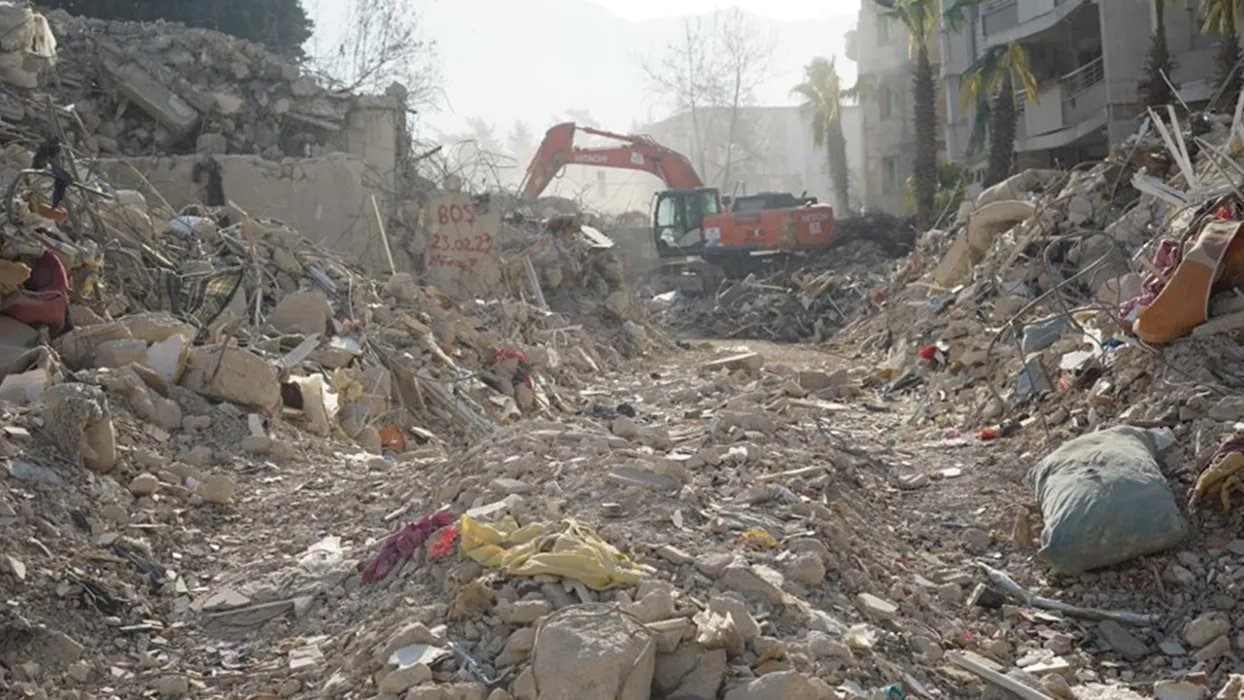Ahlam Muhtaseb | professor, CSUSB | (619)757-9870 | amuhtase@csusb.edu
Joe Gutierrez | Office of Strategic Communication | (909) 537-3007 | joeg@csusb.edu

A team of scholars, students and staff at the xREAL Lab at California State University, San Bernardino (CSUSB), in cooperation with the Immersive Media Lab and Mimesis Center for Documentary and Ethnographic Media at the University of Colorado, Boulder (CUB), started on-ground reporting on March 13 of the aftermath of the earthquake that hit Turkey and Syria on Feb. 6, using immersive technologies such as 360-degree filming.
With a small starting fund from both CSUSB and CUB, the U.S. team hired a mobile team in Istanbul that left for Adana airport in southeastern Turkey on Tuesday, March 14, 2023. The Turkey team, led by Saleh Ibrahim and Mohamed Saad, started filming the aftermath of the earthquake that left hugely devastated areas in both south Turkey and north Syria, using a 360-degree camera, in order to provide viewers with multidimensional stories of the victims.
The U.S. team has already shipped a Ricoh Theta 360-degree camera and UC Boulder is sending another this week.
The project will focus on the humanitarian crisis facing the Syrian refugee population in Turkey, one of the most impacted communities and the least to be reported on. The team hopes to not only raise awareness, but also increase empathy with the refugees in an attempt to increase humanitarian aid to this population that is not fully covered by governmental support since their status is temporary in Turkey.
The idea was proposed by CSUSB graduate alumnus Naim Aburaddi ’22, a doctoral student at CUB, who lost one of his Syrian friends and his whole family in the earthquake.
“While VR technologies have been utilized as a tool for stereotypical portrayals of Muslims in video games, I thought it is necessary to use VR in a reparative way to help marginalized groups, especially those who are suffering in Turkey and Syria due to the devastating earthquake,” Aburaddi said. “This technology can take people on an immersive journey to live what other people go through, which will have a huge impact on them and most likely will result in taking action to help these people.”
The same CSUSB team, led by Ahlam Muhtaseb, CSUSB professor of media studies and James Trotter, the assistant director of Academic Technologies and Innovation at CSUSB, started a similar project for immersive reporting on the Gaza Strip in Palestine last year. The earlier project, titled The Phoenix of Gaza, is intended to provide viewers with multidimensional stories of people in Gaza beyond the stereotypical images that associate Gaza with only violence.
The website of the project will be officially launched next month and it will include story telling using immersive technologies such as 360-degree filming and VR recreated spaces in Mozilla Hubs. In summer of 2020, and at the peak of the pandemic, Muhtaseb and Trotter started covering the plight of Palestinians in the Shatila refugee camp (Beirut, Lebanon) using immersive first-person reporting [youtube.com].
This xREAL Lab project is inspired by the United Nations VR film “Clouds Over Sidra” about the life of a Syrian refugee child in Jordan, which according to the United Nations, “was screened at a high level donor meeting prior to the Third International Humanitarian Appeal for Syria in Kuwait in March 2015, which eventually raised 3.8 billion US dollars.” As the devastation continues in south Turkey and north Syria, with the latest tremor that hit the area recently, there is a massive need for aid for the survivors and for reconstruction.
According to Al-Jazeera, over 50,000 people were killed as a result of the earthquake and its aftershocks. Al-Jazeera reports that “nearly 530,000 people have been evacuated from the disaster area in Turkey alone and the Turkish government has said that 173,000 buildings have so far been recorded as collapsed or severely damaged, with more than 1.9 million people taking refuge in temporary shelters or hotels and public facilities.”
The numbers on Syria are not very accurate and are hard to report. The project team hopes to make a small dent in the massive global aid and recovering efforts. For more information, please contact Ahlam Muhtaseb, CSUSB professor of media studies, at amuhtase@csusb.edu or (619) 757-9870.
About xREAL: Extended Reality for Learning (xREAL) Lab with Information Technology Services (ITS) at California State University, San Bernardino is an interdisciplinary technology innovation hub that brings together faculty, students and staff to imagine and design immersive learning experiences with 3D modeling and printing, augmented reality, mixed reality, virtual reality, motion caption and machine learning technologies. Each year, xREAL works with faculty fellows and undergraduate and graduate students across disciplines to provide a vision for future teaching and learning, mentorship and hands-on experience for the students, and sustainable innovation for the larger campus community. xREAL work is made possible thanks to generous support from CSUSB President Tomás D. Morales and vice president for Information for Technology Services Sam Sudhakar.